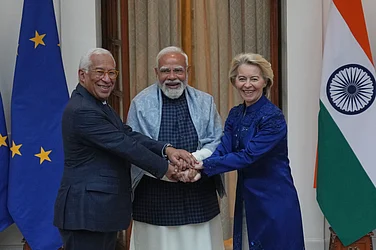The Union Cabinet on Monday approved significant initiatives, including a Rs 2,817 crore investment in the Digital Agriculture Mission and a Rs 18,036 crore rail line project connecting Mumbai and Indore. Additionally, a plan to build Kaynes Semicon’s Rs 3,307 crore semiconductor plant in Gujarat has also been approved.
The Digital Agriculture Mission will enhance farmers' income, provide digital IDs, and implement nationwide Crop Surveys, aiming to create 2.5 lakh jobs.
Meanwhile, the new rail line, set to be completed by 2028-29, will boost connectivity, support regional tourism, and enhance freight capacity.
Cabinet Approves Digital Agriculture Mission
The Union Cabinet approved a Rs 2,817 crore allocation for the Digital Agriculture Mission, aimed at improving farmers' income and creating employment in the agriculture sector.
Chaired by Prime Minister Narendra Modi, this initiative is part of a larger Rs 14,000 crore investment in seven programs.
The Digital Agriculture Mission includes the development of digital public infrastructure, such as Agristack, Krishi Decision Support System, and Soil Profile Mapping.
Key Factors & Mission
Key components include creating digital identities for farmers, conducting Digital Crop Surveys, and providing comprehensive data on agriculture.
The mission plans to issue digital IDs to 11 crore farmers by 2026 and implement nationwide Digital Crop Surveys. It also aims to enhance data accuracy for better service delivery, including crop insurance and fertilizer use, and is expected to create about 2.5 lakh jobs.
A Memorandum of Understanding has been signed with 19 states to support this mission, which is designed to streamline agricultural processes, improve transparency, and provide timely information to farmers.
Cabinet Approves Rail Line Project Of Rs 18Cr
The Cabinet Committee on Economic Affairs approved a new 309 km rail line project connecting Mumbai and Indore, with a total cost of Rs 18,036 crore.
Key Factors & Mission
The new line is part of the PM-Gati Shakti National Master Plan that aims to enhance connectivity and mobility, improving efficiency and service reliability for Indian Railways. It is expected to be completed by 2028-29, and will create approximately 102 lakh man-days of employment during construction.
The line will cover six districts in Maharashtra and Madhya Pradesh, integrating with existing rail networks and boosting regional tourism, particularly to Ujjain and Indore.
It will connect key industrial zones, such as the Pithampur Auto Cluster, and facilitate the movement of agricultural products, including millets and onions.
The project will also support the transportation of essential commodities like fertilizers, iron ore, and petroleum.
Additionally, the line will add capacity for 26 MTPA of freight traffic, reduce logistics costs, and lower CO2 emissions, contributing to climate goals. It will include 30 new stations and serve around 1,000 villages, benefiting a population of approximately 30 lakh.
Cabinet Approves Plan to Build Semiconductor Unit In Gujarat
The Union Cabinet approved Kaynes Semicon's plan to build a Rs 3,307-crore semiconductor unit in Sanand, Gujarat. This new facility will produce 6.3 million chips daily and is expected to be completed by 2028-29.
IT Minister Ashwini Vaishnaw highlighted that this project is part of the broader India Semiconductor Mission, which aims to establish a complete semiconductor ecosystem in India.
Key Factors & Mission
Prime Minister Narendra Modi emphasized that this development will enhance India's role as a semiconductor hub, benefiting multiple sectors and generating significant employment.
The proposed investment for the unit is about Rs 3,307 crore.
Chips produced in this unit will cater to a wide variety of applications which include segments such as industrial, automobile, electric vehicles, consumer electronics, telecom, and mobile phones amongst others.
Additionally, progress on Tata’s semiconductor plant in Dholera, Gujarat, is advancing well, with land acquisition and geotechnical investigations completed. This project, a joint venture with Taiwan's Powerchip Semiconductor Manufacturing Corp, represents a Rs 91,000 crore investment.
Micron is also set to launch its assembly and test facility in Gujarat next year. Vaishnaw noted that semiconductor manufacturing is crucial for India's growth and industrial expansion, and further funding for the semiconductor mission may be increased as needed. The overall initiative is a key component of India's strategy to boost its electronics manufacturing sector.





























